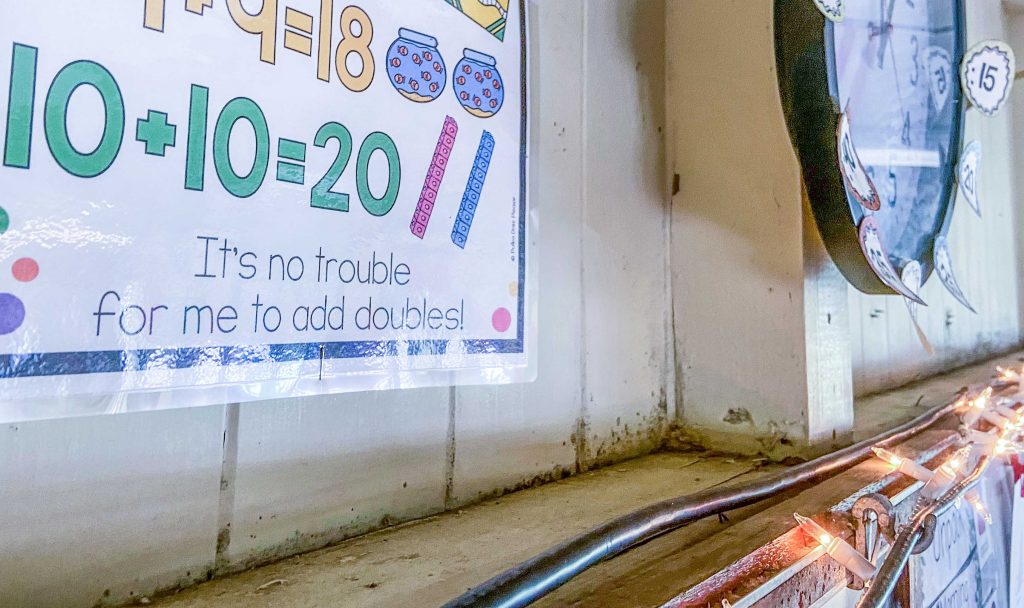State pressured to remedy mold, other problems at Hōlualoa Elementary on Big Island

A few days after the Hawaiʻi State Teachers Association disclosed long-time rat, mold and structural problems at Hōlualoa Elementary School on the Big Island, state school officials began making concrete steps toward some short-term fixes, according to the teachers association.
Shortly after the Feb. 20 news conference, teachers in Hōlualoa classrooms affected by mold growth were notified they needed to be ready to relocate their classes to other rooms on short notice, signaling that work is expected to begin soon.

Last week, campus custodians began cleaning out two portable classrooms whose students and educators had been relocated to the library and a computer lab because of mold problems.
Administrators have told Hōlualoa teachers those two classrooms will be the first to be deep cleaned, have their decades-old carpets removed and floors tiled, and painted with mold-resistant paint, according to the teachers association.
On Friday, U.S. Rep. Jill Tokuda, who represents rural Oʻahu and the neighbor islands, toured the school along with Hōlualoa Principal Glenn Gray, Honoka‘a-Kealakehe-Kohala-Konawaena Complex Area Superintendent Janette Snelling, teachers association UniServ director Audra Zook, who represents teachers there, and teacher association president Osa Tui, Jr., who had already visited the campus in late January.
“We’ve got such amazing educators that are here, trying to do everything they can to be resourceful and resilient so that they can take care of the health of our kids and really provide them with quality education,” Tokuda said. “But all of us have to do more to make sure we’re providing everyone here on the school campus and in the school community with a healthy, safe, and conducive environment in which they can work and they can learn.”
After Friday’s tour, Snelling met with Zook and Tui.
“Teachers don’t trust what the DOE [Department of Education] is saying they will do, because they’ve been told the old carpets would be torn out and replaced for at least three years, but nothing has happened,” Zook told Snelling, according to the teachers association press release. “Parents and teachers deserve to know when these projects are going to happen and be completed.”
Earlier this month, before holding a news conference raising concerns about longstanding problems at Hōlualoa, the teachers association sent Snelling a request for information letter, asking for a timeline of mold remediation plans as well as efforts to:
- Remove paint containing lead throughout the campus
- Install ceiling fans in portables that do not have them, and repair the broken or water-logged fans
- Paint all classrooms with mold-resistant paint
- Repair termite damage throughout the campus
- Repair or replace the walkway ceiling in C building
- Replace rotting stilts that hold up the portable containing the student services coordinator’s office
- Address deep ruts, cracks, and constant debris removal of the public road that runs through the campus
- Address the rodent infestation
- Repair the largest campus bathroom’s structural damage or replace with a bathroom that is structurally sound
- Perform a formal inspection of the foundation concerns in portables and buildings throughout the campus.
To address those many outstanding concerns, Snelling told the teachers association via email on Friday that “I will be conferring with AS Tanaka [Randall Tanaka, assistant superintendent of HIDOE’s Office of Facilities and Operations], Principal Gray and our facilities team. I will reach out if clarification is needed.”
State Sen. Dru Kanuha (D, Kona, Kaʻu), who represents the area in the Senate, has been tracking problems at the school for months.
In January, Kanuha introduced a proposal (SB1575) that calls for about $48.5 million to be spent on various construction projects on the campus, including:
- $26.2 million to plan, design and construct phase one of a master plan for campus improvements
- $22 million to plan and construct a new two-story building on the campus
- $300,000 for “construction for the replacement of carpets with tile in C and D buildings”
- $75,000 for “construction for the installation of air conditioning throughout the school for mold mitigation.”
Sponsored Content
Comments





_1770333123096.webp)


